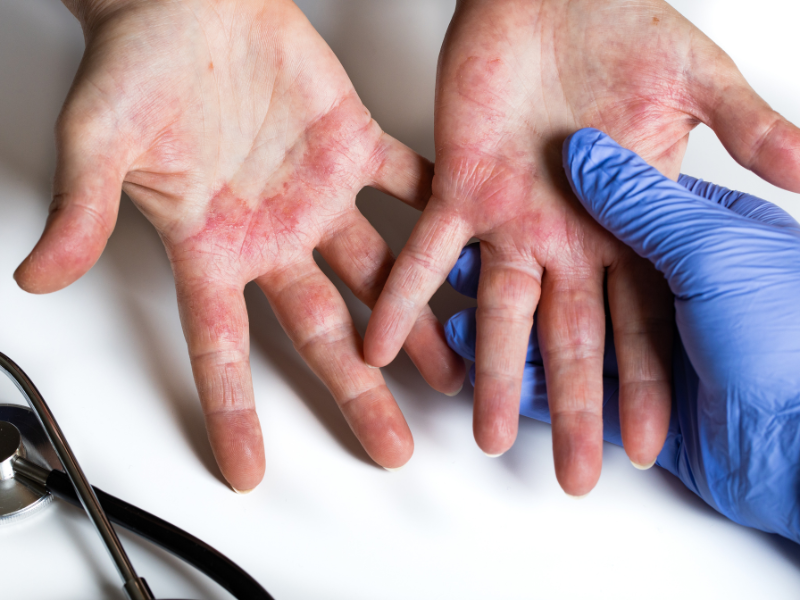Atopic Dermatitis: Navigating Symptoms, Triggers, and Treatment

Atopic Dermatitis, also known as eczema, is a common skin condition that causes itchy, dry, and irritated skin. It is most frequent in young children, but it can happen at any age.
This chronic condition flares up from time to time. It can be annoying, but it is not contagious. Atopic dermatitis patients are at risk of acquiring food allergies, hay fever, and asthma.
While it can be challenging, understanding the causes, symptoms, triggers, risk factors, prevention strategies, and treatment options is key to managing this condition effectively.
What Causes Atopic Dermatitis?
Atopic dermatitis stems from a combination of the following factors:
- Genetics: A family history of atopic dermatitis, asthma, or hay fever can increase the likelihood of developing the condition.
- Immune System: It is linked to an overactive immune response that triggers inflammation in the skin.
- Barrier Function: People with compromised skin barrier function are more susceptible to moisture loss and irritants. This can lead to the development of atopic dermatitis.
What Are the Symptoms of Atopic Dermatitis?
Symptoms of this condition can arise anywhere on the body . It can also vary greatly across individuals. They could include:
- Itchy Skin: Intense itching is a hallmark symptom. It often leads to scratching that exacerbates the condition.
- Dryness and Redness: Affected areas tend to be dry, red, and inflamed. This makes the skin prone to cracking and bleeding.
- Bumps and Blisters: Raised bumps and fluid-filled blisters can form. This can cause discomfort and further itching.
- Thickened Skin: Over time, repeated scratching can result in thickened and leathery skin.
What Triggers Atopic Dermatitis?
Various factors can trigger or exacerbate atopic dermatitis symptoms. The triggers also vary from person to person. Try to identify and avoid irritants that cause flare-ups. Common triggers include:
- Irritants: Soaps, detergents, certain fabrics, and even sweat can trigger flare-ups.
- Allergens: Substances like pollen, pet dander, and dust mites can worsen symptoms for some individuals.
- Dry Skin: Cold weather and low humidity levels can lead to dry skin. This makes this skin allergy more pronounced.
- Stress: Emotional stress can trigger or worsen flare-ups in some people.
Risk Factors for Atopic Dermatitis
A primary risk factor for atopic dermatitis is a history of hay fever, allergies, or asthma. Furthermore, the presence of these conditions in your family also heightens your risk. Those who live in urban areas or have exposure to certain allergens can also increase the risk.
How to Prevent Atopic Dermatitis?
Developing a basic skincare routine may aid in the prevention of eczema flare-ups. The following suggestions may assist in reducing the drying effects of bathing:
- Moisturize Regularly: Keeping the skin well-moisturized helps maintain its barrier function. Moisturizing also reduces dryness.
- Avoid Triggers: Identify and avoid substances or situations that trigger flare-ups. This includes harsh soaps or certain fabrics.
- Hydrate: Drinking sufficient water helps maintain overall skin health and hydration.
- Manage Stress: Practicing stress-reduction techniques can contribute to preventing flare-ups. This includes meditation or yoga.
How to Treat Atopic Dermatitis?
For those dealing with atopic dermatitis, several treatment options are available:
- Topical Treatments: OTC or prescription creams can help manage symptoms. This includes those that contain corticosteroids or other anti-inflammatory ingredients.
- Moisturizers: Use fragrance-free, hypoallergenic moisturizers regularly. This help keeps the skin hydrated and reduce itchiness.
- Antihistamines: Oral antihistamines can help alleviate itching and discomfort, especially at night.
- Prescription Medications: For severe cases, doctors may prescribe immunosuppressants or biologics.
Lifestyle Tips
Gentle cleansing with mild, fragrance-free cleansers prevents further skin irritation. Opting for lukewarm baths instead of hot showers helps prevent skin dryness. Choosing soft, breathable fabrics minimizes skin irritation. Also keeping nails short prevents scratching-induced skin damage.



